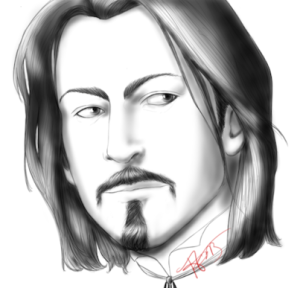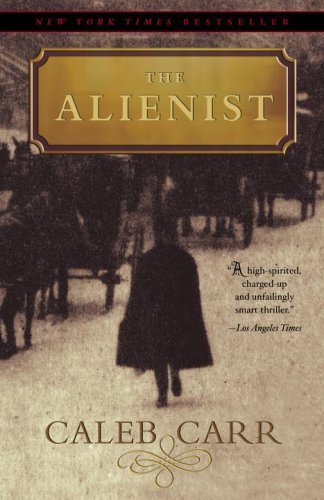I am pleased to report that Dr. Laszlo Kreizler’s character profile has finally been added to the main characters page of the full character list. A copy of the doctor’s profile can be viewed below.
Kreizler, Doctor Laszlo
Appears in The Alienist and The Angel of Darkness
 Dr. Laszlo Kreizler, the leader of the investigative team in The Alienist and The Angel of Darkness, is a specialist in child and criminal psychology. He is a pioneer in the theory of “context,” the idea that personality and behaviour is determined by an individual’s childhood experiences, and he applies this theory to the creation of psychological profiles of the killers being pursued by the investigative team. In this way, Caleb Carr has stated that he wanted to create Dr. Kreizler as a character who would be able to “solve all the crimes [Sherlock] Holmes couldn’t, in which there’s little or no physical evidence and no apparent motive — the product of aberrant criminal psychology.”1 In keeping with this, Dr. Kreizler is described as one of the foremost experts on criminal insanity in New York, and when he is not involved in the team’s investigations, he works as an expert witness on criminal cases as well as running the Kreizler Institute for Children, a centre he founded for the study and treatment of children with psychological disorders brought about by environmental factors.
Dr. Laszlo Kreizler, the leader of the investigative team in The Alienist and The Angel of Darkness, is a specialist in child and criminal psychology. He is a pioneer in the theory of “context,” the idea that personality and behaviour is determined by an individual’s childhood experiences, and he applies this theory to the creation of psychological profiles of the killers being pursued by the investigative team. In this way, Caleb Carr has stated that he wanted to create Dr. Kreizler as a character who would be able to “solve all the crimes [Sherlock] Holmes couldn’t, in which there’s little or no physical evidence and no apparent motive — the product of aberrant criminal psychology.”1 In keeping with this, Dr. Kreizler is described as one of the foremost experts on criminal insanity in New York, and when he is not involved in the team’s investigations, he works as an expert witness on criminal cases as well as running the Kreizler Institute for Children, a centre he founded for the study and treatment of children with psychological disorders brought about by environmental factors.
Dr. Kreizler’s drive to understand the origins of criminal behaviour and to help children with troubled backgrounds originates in his own childhood. Although the doctor’s parents were popular socialites in upper-class New York society, we learn midway through The Alienist that behind closed doors Dr. Kreizler’s father was an abusive alcoholic. The elder Kreizler frequently beat his son, with the worst confrontation permanently disfiguring the younger Kreizler’s arm, and he was also emotionally abusive, leaving his son “full of doubts about his own judgment and abilities.” Dr. Kreizler’s mother appears to have offered little solace. Even though she was not abusive, she turned a blind eye to the abuse taking place in the household. This, too, influenced the younger Kreizler; within The Angel of Darkness, we learn that as a young man he formed an attachment to a woman who reminded him of his mother because, on an unconscious level, he had wanted to be able to change her.
Although these dark elements of the doctor’s past help to drive him professionally, they also cause him to stumble occasionally during the team’s investigations. Due to his troubled childhood, Dr. Kreizler is quite emotionally distant and prefers to analyse his emotions in an objective manner rather than confronting them. Although this ability to objectively analyse emotions helps to make the doctor highly perceptive of the emotions of others, his tendency to avoid his own emotions makes it difficult for him to think rationally on the occasions when emotions overwhelm him. One noteworthy incident occurs during The Alienist when, after discovering a number of parallels between the killer’s early life and his own, Dr. Kreizler makes additional inferences about the killer’s past based solely on his own personal experience, a phenomenon known as “the psychologist’s fallacy.”
The protagonist of both Alienist books, Dr. Kreizler’s role as a psychological profiler is essential to both investigations. He is responsible for initiating the investigation within The Alienist in collaboration with Theodore Roosevelt, and although it is Sara Howard who is first presented with the child abduction case in The Angel of Darkness, she knows that without Dr. Kreizler’s help, the investigative team will be unlikely to solve the case. Nevertheless, Dr. Kreizler knows that hunting for the killers in both investigations is not a one-man job, and early in The Alienist he is responsible for determining what additional expertise the investigative team requires for him to be able to successfully perform his role as a profiler. Without the forensic expertise of the Isaacson brothers, John Schuyler Moore’s knowledge of New York’s criminal underground, Stevie Taggert and Cyrus Montrose’s knowledge of life on the streets, and Sara Howard’s skills as a private detective, the doctor would be unable to construct the profiles necessary for pre-empting the next move of the killers in both novels; profiles that eventually result in their identification and apprehension.
References
1. Naparstek, Ben, “Carr Trouble”, The Age 6 November 2005. Link.

